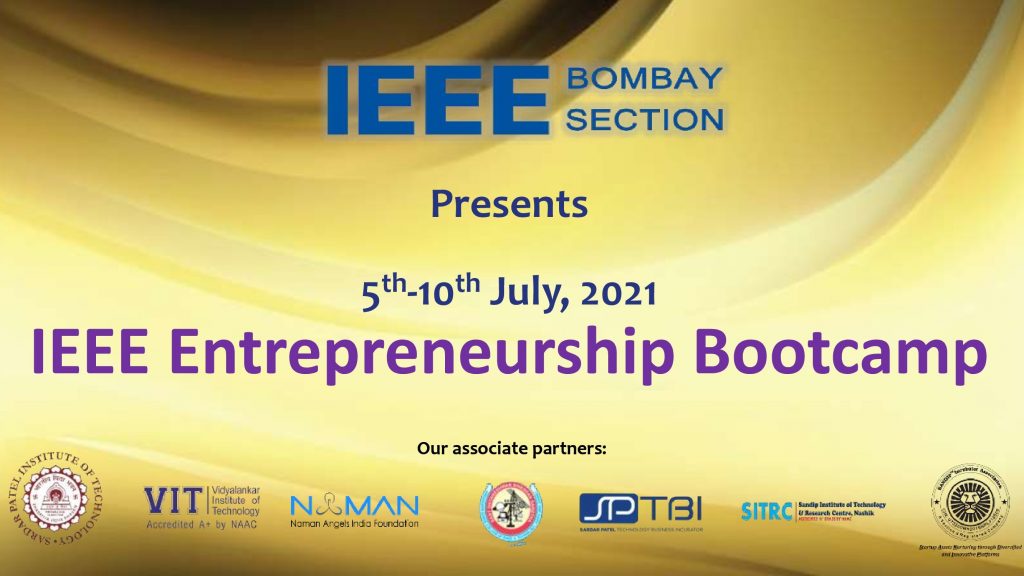
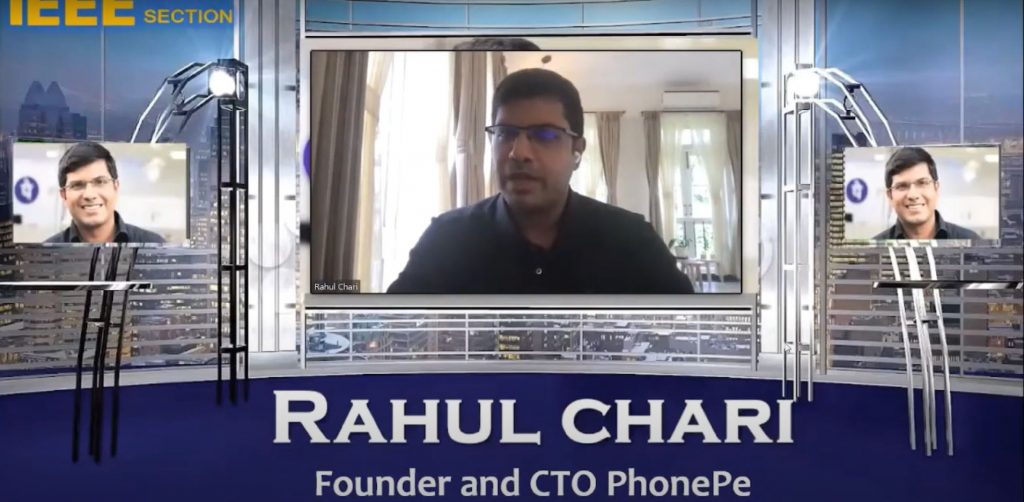
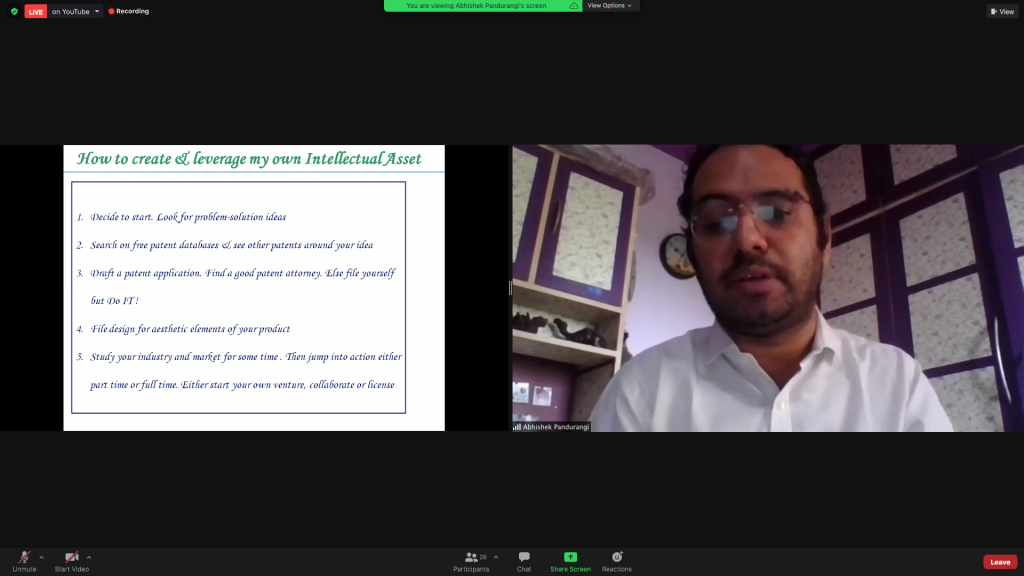
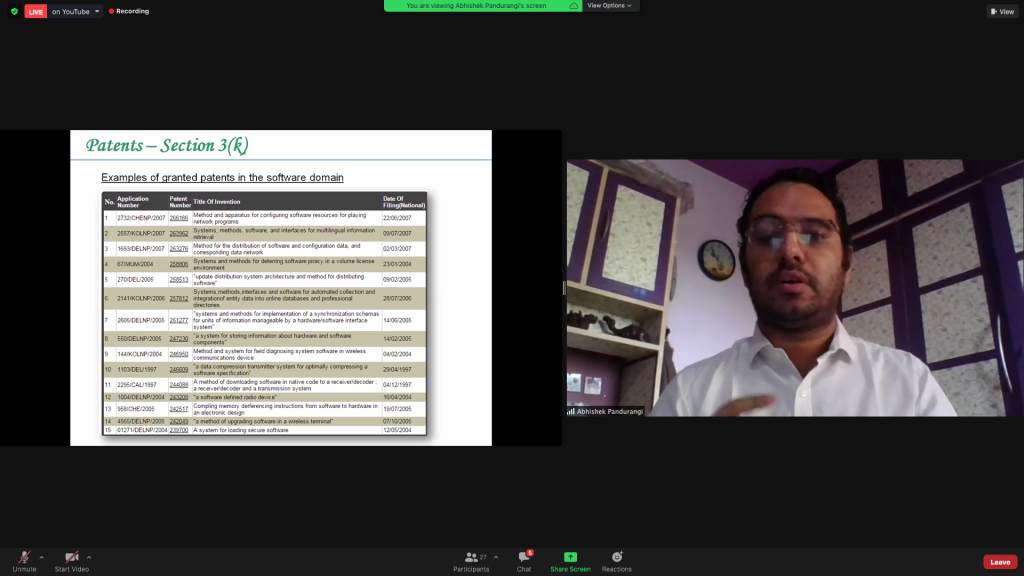
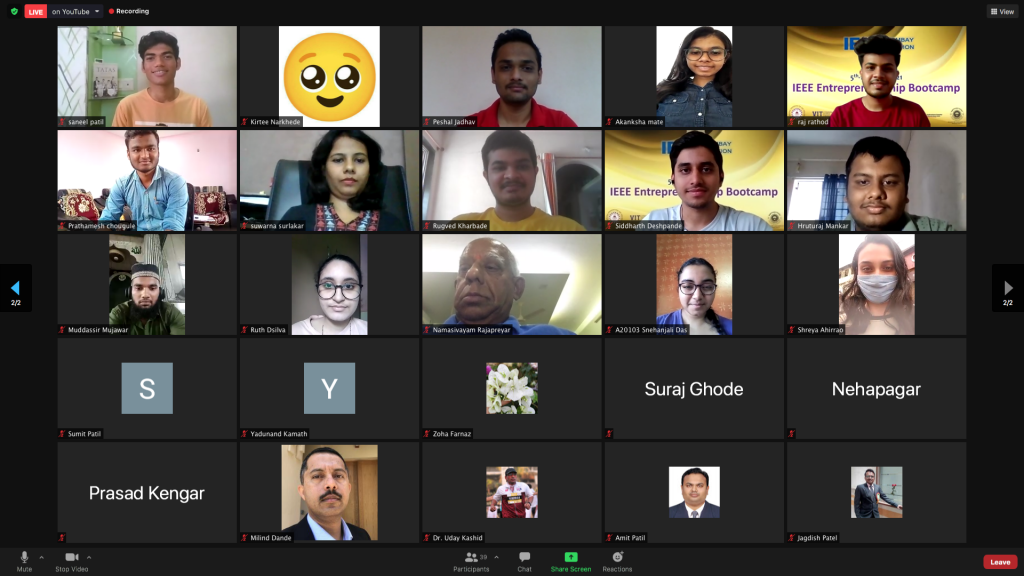
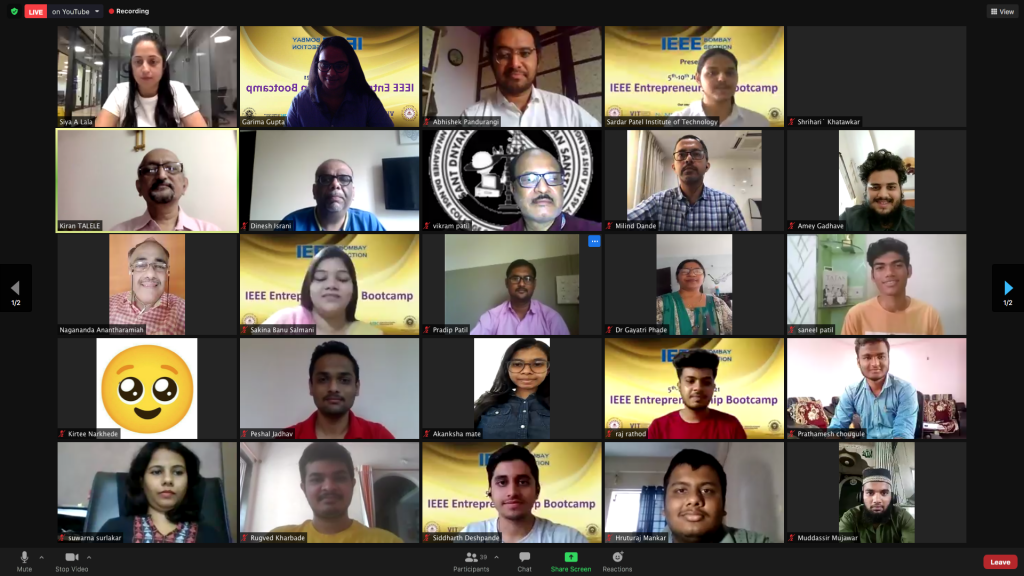
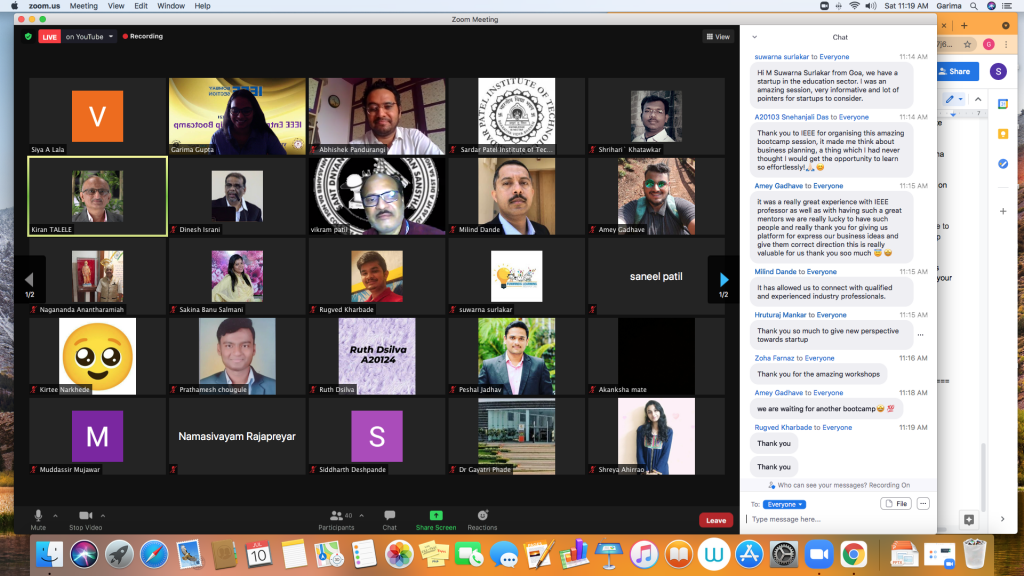
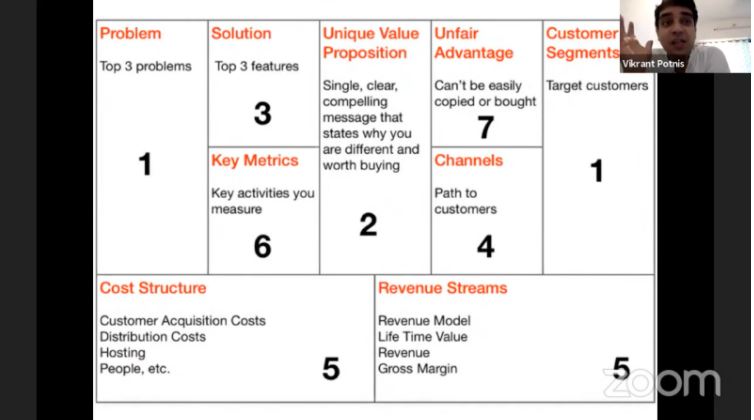
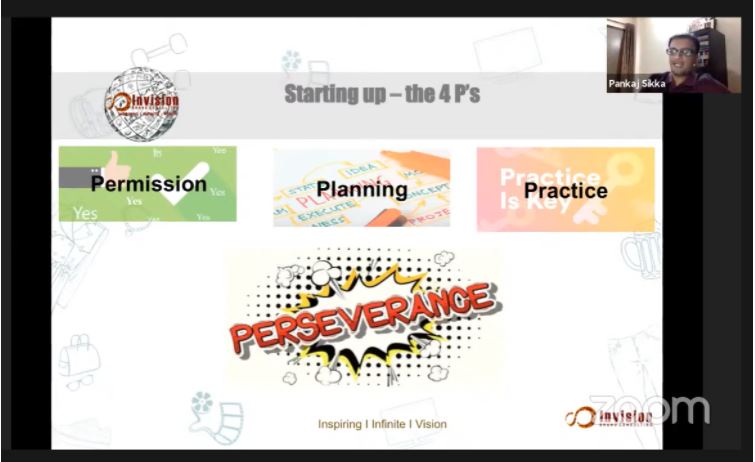
IEEE Entrepreneurship Bootcamp 2021 was launched jointly with Sardar Patel Institute of Technology, Mumbai, Vidyalankar Institute of Technology, Mumbai, Sandip Institute of Technology & Research Centre Nashik, and Naman Angels India Foundation to trigger the entrepreneurship bugs in the minds of young budding professionals. The event had 4400 registrations from different cities and states around the nation. A total of 4050 students, 248 Faculty and 92 Professionals registered for IEEE Entrepreneurship Bootcamp 2021.
The Bootcamp program was a mix of Training Sessions on Entrepreneurship Fireside Chats, Heart-to-Heart Talks, Inspiring Founders’ Speech by successful start-up founders and Activity Canvas. You can view the entire playlist of the Bootcamp here.
Let us look at what went down during the bootcamp.
Day 1: 5/7/2021
The event was officially started by the virtual ribbon-cutting ceremony by Mr Rahul Chari, Founder & CTO, PhonePe. This was followed by opening remarks by Dr B Satyanarayana, Chair, IEEE Bombay Section, Scientific Officer, TIFR, Mumbai where he noted that advances in technology for the betterment of humanity is the tagline of IEEE that has come up very well in its work as no matter what we innovate the ultimate beneficiary is the common man.
Mr Anand Gharpure, chair-elect IEEE Bombay Section declared the beginning of the Entrepreneurship Bootcamp 2021. Dr S.T. Gandhe, Dr Vikram Patil, Dr Saurabh Mehta, Mr Abhay Phansikar graced the audience with their presence.
The session started with a keynote address by Mr Rahul Chari, founder, and CEO of Phonepe. He stated that entrepreneurship can create social and population-wide benefits. He then carried us through his journey and experiences up until PhonePe.
Then a session was conducted by Juthika D’Cruz on the topic “Napkin Pitch”. She explained the importance of self presentation while selling a product and how one market themselves before they market their products.
Next, Raina Tandon, Posh Specialist, and Thought Leader spoke about how we were on that first pedestal and want to win on the edge and create the right image to crack one’s entrepreneurship journey.
Day 2: 6/7/2021
Mrs.Neelam Kamthe, Asst. The Director of ‘Bhartiya Vidya Bhavan’ started the first session focusing on the topic “NEEDS & WANTS”. Neelam ma’am explained what needs and wants are and their importance in our life. The next part of the session was Maslow’s hierarchy of needs, which consisted of 3 parts: physiological needs, psychological needs, and self-fulfilment needs. The speaker also mentioned how a business will not be affected in even times like covid. This is done by identifying people’s needs and trying to solve and fulfil them and then creating revenues appropriately.
The second session was by Pranav Chawre, the co-founder of VMOSA technologies, on founders speech. He explained about his own start-up G.O.D i.e. Guruji On Demand, which is a platform to book rituals in simple steps. He also gave his life experiences about how he reached his goal. This session was also a very interactive one where the speaker answered the doubts of the attendees with proper information and solutions for the problems asked.
Day 3: 7/7/2021
The first session for the day was conducted by Mr Dinesh Israni the founder of Naman Angels India, titled: Ideation and opportunity. In the course of the session, Mr Israni discussed the importance of an Idea becoming an opportunity when it reaches the market. There was a brief discussion on the pitfalls one should consider while formulating ideas for opportunities. The importance of the RAMP model in validating a business idea was highlighted and explained. Eventually, the discussion moved onto competitor analysis and was wrapped up with the speaker stressing the importance of failure in startups.
The Second session was conducted by Mr Sahil Ghuge, a Third-year student at ICT Mumbai and founder of his health-based food product protein bites. He helped the attendees understand the challenges faced by a budding entrepreneur especially from the perspective of a college student. In addition to a good friend circle, the importance of having a mentor was stressed by the speaker. The session was both informative and insightful.
Day 4: 8/7/2021
The session by Mr Vikrant Potnis gave a comprehensive understanding about a business model and gave various major points on why start-ups fail. Sir began the webinar by stating a concrete fact that “More than 90% of start-ups fail in the initial year itself”. He stated many reasons as to why this happens like articulation problem, more competition, running out of cash, weak product/service etc. He then gave solutions explaining that taking surveys, thinking about product’s innovation and all is an old approach to solving these problems and Thinking about customers first, Thinking about customer challenges first is a better way to run a business because “Life is too short to build something nobody wants”. Furthermore, he explained the procedure of creating a business model using the lean canvas.
Later, Mr Pankaj Sikka gave a casual talk about start-ups and why is everybody interested in doing them why do start-ups even do start-ups if there is a very less probability of success. Sir started the session by asking that why suddenly the culture is adopting the new norm of start-ups, answering that he said mainly many of us want to do a start-up is the passion inside us, sometimes maybe money or maybe you want to solve a genuine problem in the world because you have a better solution to it. He then stated the 4 P’s essential for a start-up are: Permission, Planning, Practice and most importantly Perseverance. He concluded that the only permission to startup is that to be taken from ourselves and that starting is important no matter the scale or speed.
Day 5: 9/7/2021
In the Morning session of Bootcamp, Mr Chandrabhan Singh explained and discussed the business plan in a very practical way. Sir began the session by explaining the steps for preparing a business plan: Market research, business model, marketing planning, long term goals, team building, etc. Sir then described how the market research is done by giving the practical example of a company named Zostel that the co-founders and some of their colleagues did good research in that particular industry. Further, the importance of the business model canvas was mentioned since it describes what we want to do and the marketing planning illustrates how you want to do a business and marketing of the same.
The evening session of fireside chat by Ms Aparna Mishra started off with the extensive and insightful story of her Entrepreneurship journey. Ma’am suggested having prior experience, working in a domain in which we want to do business before actually planning a business always has its advantages. Ma’am conveyed many life examples as well as experiences which she had. Also, the difficulties ma’am faced during her 28 years of corporate journey and how they came up with a positive attitude was shared.
Day 6: 10/7/2021
The session by Abhishek Pandurangi and Siya Lal gave a comprehensive understanding of how to file a patent on new and creative ideas and how they are different from trademarks. Abhishek Pandurangi began the webinar by providing a detailed explanation of intellectual property/asset which gives you a right to have a monopoly on the asset and emphasized that it is not a license. He then gave a technical explanation of patent rights through quotes and various examples. Through the Patents act 1970, he cleared the air on whether or not ideas can be patented. Putting together details like photo tagging in Facebook, lens kart- face modelling he elaborated more on such examples on intellectual assets. Assembling the steps on how to create and leverage intellectual assets, he concluded his session.
Siya Lal started with the detailing’s of trademarks and how we can register for them, elaborating on TM, SM and R. She emphasised how associations that are created from certain marks need to be protected because people start identifying the brand through these marks. Various trademarks and their detailing’s were given for a better understanding and how a patent is different from a trademark as a patent is generally given to new ideas. In the end, she gave insights on how to register for a trademark and its validation period.
During the six days, there were varied activities which were conducted starting from understanding one’s inner-self and putting it in a video to penning down their needs and moving to understand their wants. A case study was done on the journey of an entrepreneur of a local company from zero to hero. Finally, a Business Model was made for their idea and a formal Business Plan was documented. IEEE Quiz was conducted on all days of Bootcamp to encourage active participation. The first person with the maximum score was declared as the winner. The winners of the Quiz were from different parts of India.
